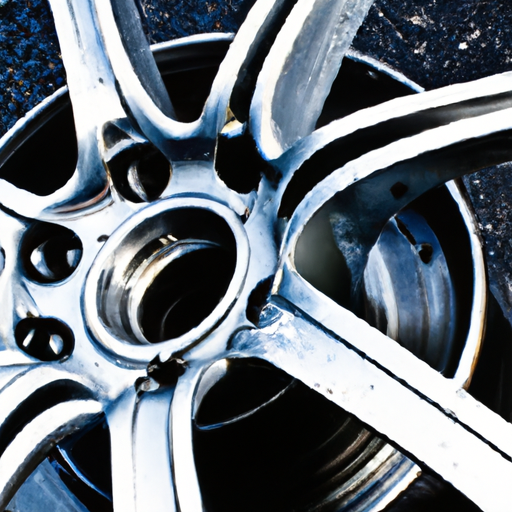If you’ve ever wondered about the durability of forged wheels versus cast wheels, look no further. This article aims to shed light on the age-old debate and discern whether forged wheels truly hold the advantage when it comes to durability. With a focus on the key factors that determine a wheel’s strength, we’ll explore the characteristics of forged and cast wheels, ultimately revealing which ones are more likely to withstand the tests of time and road. So, get ready to uncover the truth and make an informed decision for your next wheel upgrade!
Cost
Material cost
When it comes to the cost of wheels, the material used plays a significant role. Forged wheels are generally made from high-quality aluminum or magnesium alloys, which tends to be more expensive compared to the materials used in cast wheels. The higher material cost is due to the extensive manufacturing process that forged wheels undergo, leading to their superior strength and performance.
Production cost
In terms of production cost, forged wheels are typically more expensive to manufacture than cast wheels. The forging process involves heating the metal to a high temperature and then shaping it using extreme pressure. This intricate process, coupled with the use of premium materials, increases the overall cost of production. On the other hand, cast wheels are created by pouring molten metal into a mold, which requires less time and energy, leading to lower production costs.
Repair cost
When it comes to repairing damaged wheels, forged wheels generally have an advantage over cast wheels. In the event of a minor dent or crack, forged wheels can often be repaired. Thanks to their superior material strength, a skilled technician can typically fix the damage without compromising the overall integrity of the wheel. Cast wheels, on the other hand, are more prone to cracking and are usually more challenging to repair. In most cases, repairing cast wheels involves replacing the entire wheel, which can be more costly than repairing a forged wheel.
Strength
Material strength
When it comes to strength, forged wheels are known for their exceptional performance. The forging process that these wheels undergo creates a grain structure that follows the shape of the wheel, resulting in a stronger and more durable product. This superior material strength allows forged wheels to withstand higher loads and impacts, making them less prone to bending, cracking, or breaking under stressful conditions. Cast wheels, while still sturdy, do not offer the same level of material strength as forged wheels.
Impact resistance
Forged wheels excel in impact resistance due to their inherent material strength. Their ability to withstand heavy loads and absorb impact forces makes them an ideal choice for both high-performance applications and daily driving. Whether you encounter potholes, curbs, or other road hazards, forged wheels are less likely to be damaged by these impacts. Cast wheels, while generally strong, are more susceptible to bending or cracking when subjected to significant impacts.
Fatigue resistance
Another aspect of strength to consider is fatigue resistance. Fatigue occurs when a material undergoes repeated stress cycles, which can eventually lead to cracks or fractures. Forged wheels have excellent fatigue resistance due to their grain structure and superior material composition, allowing them to withstand prolonged, repetitive stress. Cast wheels, on the other hand, may be more prone to fatigue failure over time, especially in demanding applications or if subjected to constant heavy loads.

Weight
Material density
Material density plays a significant role in determining the weight of a wheel. Forged wheels are typically lighter than their cast counterparts due to the use of advanced alloys with lower density. The forging process compresses the material, making it denser and, subsequently, lighter. The reduced weight offers several benefits, including improved acceleration, braking, and overall vehicle performance.
Weight reduction benefits
The weight reduction benefits of forged wheels extend beyond enhanced performance. Lighter wheels also contribute to better fuel efficiency, as they reduce the rotational mass that the engine must overcome. This reduction in overall weight can result in improved handling, responsiveness, and agility. Furthermore, the decreased unsprung weight allows the suspension system to work more effectively, leading to a smoother and more comfortable ride.
Manufacturing Process
Forged wheel manufacturing process
The manufacturing process of forged wheels involves several intricate steps. Initially, a solid piece of aluminum or magnesium alloy is heated to a high temperature, which softens the material. It is then placed under immense pressure using hydraulic presses or hammers, forcing the metal to take the shape of the wheel mold. The intense pressure compresses the grain structure of the metal, resulting in enhanced strength and durability. After forging, the wheel undergoes machining to create the necessary features and mounting points.
Cast wheel manufacturing process
In contrast, the manufacturing process for cast wheels involves pouring molten metal, typically aluminum or steel, into a mold. The molten metal is allowed to cool and solidify, taking the shape of the mold. Once the metal has hardened, it is removed from the mold, and any excess material is trimmed off. Cast wheels are generally simpler and quicker to produce compared to forged wheels, making them a more cost-effective option. However, the casting process can result in a less dense material structure and decreased overall strength.

Material Properties
Forged wheel material properties
Forged wheels are crafted from premium alloys known for their exceptional properties. These materials, such as aluminum or magnesium alloys, provide outstanding strength, lightweight characteristics, and high-temperature resistance. The forging process further refines the metallurgical structure, resulting in improved corrosion resistance, reduced porosity, and enhanced mechanical properties. These material properties make forged wheels ideal for demanding applications, ensuring durability and longevity.
Cast wheel material properties
Cast wheels, on the other hand, are made from poured molten metals. While cast wheels also exhibit decent strength and performance, their material properties may not be as refined as those of forged wheels. Cast wheels are usually made from aluminum or steel alloys, offering good durability and corrosion resistance. However, the casting process can introduce microscopic voids or porosity, which may affect the overall material integrity. Nonetheless, cast wheels still provide reliable performance for a wide range of applications.
Performance
On-road performance
In terms of on-road performance, forged wheels offer several advantages. The combination of their superior strength, lighter weight, and optimized material properties translates into enhanced handling, maneuverability, and braking capabilities. With forged wheels, vehicles can navigate corners more precisely and experience improved stability at higher speeds. The reduced unsprung weight also allows suspension systems to work more effectively, resulting in better road contact and a smoother ride.
Off-road performance
Off-road enthusiasts often prioritize durability and performance, making forged wheels an attractive choice. The robust construction and exceptional strength of forged wheels make them better equipped to handle the rugged conditions encountered during off-road adventures. Whether conquering rocky terrain, maneuvering through mud, or traversing uneven surfaces, forged wheels offer the necessary toughness and impact resistance. Their ability to withstand heavy loads and absorb shocks makes them a reliable option for off-road enthusiasts.

Aesthetics
Design options
Both forged and cast wheels provide a multitude of design options to suit various vehicle styles and personal preferences. From sleek and modern designs to classic and timeless styles, wheel manufacturers offer a wide array of options to cater to every taste. Whether you prefer intricate patterns, multi-spoke designs, or a clean and minimalist look, there are countless choices available. Both forged and cast wheels can be customized with different finishes, such as painted, polished, or machined surfaces.
Finish options
The choice of finish can significantly impact a wheel’s aesthetic appeal. Forged wheels often offer greater versatility in terms of finishes due to their denser material structure. They can be finished with a high-polished shine, providing an eye-catching display of the wheel’s intricate design. Additionally, forged wheels can be powder-coated or painted in various colors, allowing for more customization options. Cast wheels, while still offering a range of finishes, may not provide the same level of finish options as forged wheels.
Longevity
Usable lifespan
When it comes to longevity, forged wheels have a significant advantage over cast wheels. The manufacturing process and material properties of forged wheels result in superior durability and longevity. With their enhanced strength, impact resistance, and fatigue resistance, forged wheels can withstand demanding driving conditions and heavy loads for an extended period. Cast wheels, while still durable, may be more prone to cracking, bending, or breaking over time, especially if subjected to harsh conditions or significant impacts.
Corrosion resistance
Both forged and cast wheels typically undergo treatments to enhance their corrosion resistance. However, forged wheels may offer superior corrosion resistance due to their refined material properties and more precise manufacturing process. The compression of the metal during forging helps eliminate microscopic voids or imperfections that could act as potential weak points for corrosion. Proper cleaning and maintenance can significantly prolong the lifespan of both forged and cast wheels, reducing the risk of corrosion and ensuring their appearance and performance are maintained over time.

Maintenance
Cleaning and care
To maintain the aesthetic and performance qualities of both forged and cast wheels, regular cleaning and care are essential. It is recommended to clean wheels regularly using a non-acidic, wheel-specific cleaner and a soft brush or sponge. Additionally, avoiding harsh chemicals, abrasive cleaners, or stiff brushes can prevent damage to the wheel’s finish. Both types of wheels should be thoroughly dried after cleaning to prevent water spots or potential corrosion. Regular inspections can help identify any signs of damage or wear that may require attention.
Refurbishment options
Over time, wheels can become scratched, chipped, or develop other cosmetic imperfections. Fortunately, both forged and cast wheels can be refurbished to restore their original appearance. Refurbishment options typically involve processes such as polishing, powder coating, or repainting to address any cosmetic issues. However, it is important to note that cast wheels may be more challenging to repair due to their potential structural limitations. Professional refurbishment services can assess the extent of the damage and recommend the most suitable course of action for each wheel type.
Application
Street use
Forged and cast wheels are suitable for street use, providing durability, performance, and aesthetic appeal. For daily driving, both wheel types fulfill the necessary requirements, ensuring a safe and reliable performance. However, those looking for the enhanced strength, lightweight characteristics, or customizable options may lean toward forged wheels. Cast wheels remain a popular choice for street use, offering a balance between cost, performance, and aesthetics.
Racing applications
When it comes to racing applications, the demands on wheels are significantly higher than typical street use. In this domain, forged wheels are often the preferred choice due to their exceptional strength, lighter weight, and increased impact resistance. The ability to withstand extreme forces and intense driving conditions sets forged wheels apart in racing applications. The rigors of high-speed racing, aggressive cornering, and repeated impacts make forged wheels an excellent choice for those seeking optimal performance on the track. Cast wheels can still be used for racing, but they may be more prone to damage and may not offer the same level of performance as forged wheels.
In conclusion, while both forged and cast wheels have their own merits, it is clear that forged wheels offer superior durability, strength, and performance. They may come at a higher initial cost and production expense, but the benefits they provide in terms of longevity, impact resistance, and weight reduction make them a worthwhile investment. Whether for street use or racing applications, if you seek exceptional performance, customization options, and longevity, forged wheels are the way to go.


